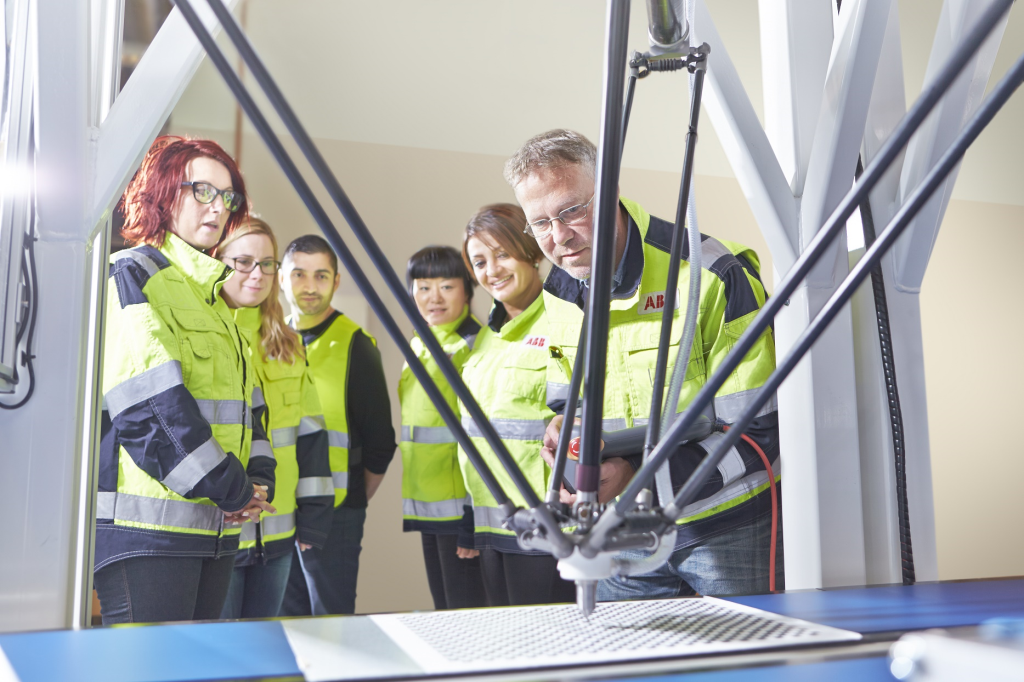 The take-up of robotic automation in the UK is being held back by lingering and outdated misconceptions that are seriously impairing both our productivity and our ability to compete on the global stage. Mike Wilson, Business Development Manager UK & Ireland at ABB Robotics, explains how these misconceptions are being tackled by ABB’s Switch to Robots seminars, which are open to any UK manufacturer interested in taking the first steps to robotic automation.
The take-up of robotic automation in the UK is being held back by lingering and outdated misconceptions that are seriously impairing both our productivity and our ability to compete on the global stage. Mike Wilson, Business Development Manager UK & Ireland at ABB Robotics, explains how these misconceptions are being tackled by ABB’s Switch to Robots seminars, which are open to any UK manufacturer interested in taking the first steps to robotic automation.
What is the thinking behind the Switch to Robots seminars?
The UK’s poor uptake of robotic automation compared to the rest of the world is well known. Although robots are widely credited as part of the success story of the UK’s automotive industry, their use has been slow to filter down throughout other industrial sectors.
In 2017, we ran a survey to try to find out why. Based on responses from a range of companies of all sizes, it revealed a large percentage have yet to keep up with their international competitors and embrace robotic automation. The main reasons given included cost of purchase and ownership; a lack of skills and experience in specifying, operating and maintaining robots; and a belief that robots are unsuitable for low volume processes.
The aim of the Switch to Robots seminars is to address these concerns and explain how developments in technology, including reduced complexity and greatly enhanced flexibility, are enabling robots to be successfully deployed in a growing range of applications. Since we started running the seminars, we’ve had delegates from a wide variety of industry sectors, all of whom have been interested in finding out more about applying robots to their processes.
What is the main message behind Switch to Robots?
The key point is that the UK needs to change its attitudes to robotic automation, and fast, if we are to be able to keep up with our global competitors. A look at the global comparison of robot adoption in the latest International Federation of Robots (IFR) statistics shows how far we are behind the rest of the world, even though we are one of the world’s leading economies.

Although as a nation we’ve always been very good at innovation, we’ve never been very good at investing in the future.
Evidence for this comes from the All-Party Parliamentary Manufacturing Group’s (APMG) report entitled ‘Making Good – A study of culture and competitiveness in UK manufacturing’. Commissioned as part of a drive to find ways to make the UK one of the world’s leading manufacturing nations, the report exposed a serious failing amongst British companies when it comes to investing in new production technologies.
Our aim is to show how a commitment to investment in these technologies can help companies to grow their businesses and to demonstrate how we can help them to achieve this.
There has been a lot in the press about the UK’s low productivity – how could robots help to address this?
Automation not only provides increased productivity, but brings UK manufacturers improved product quality, reduced costs, improved quality of work for employees and a reduction in waste. In the UK, we have many companies that require flexibility as they are not necessarily high volume manufacturers.
Robots provide manufacturers with the flexibility they need, including the ability to produce a variety of products using the same robot or robot cell.
A great example is personalised confectionery manufacturer Boomf, which installed an ABB IRB 1200 robot fitted with a PTFE-coated blade to speed up its cutting process. Now robot automation has been applied, the process takes 17 seconds rather than five minutes, wastage has significantly decreased and productivity is up. Furthermore, Boomf can respond to seasonal trends in demand.

Why should people attend a Switch to Robots event?
In order to secure our place in the global market, UK companies large and small need to learn how to implement flexible automation – and fast.
Our Switch to Robots events give delegates an objective look at what can be achieved with robots and explain what’s involved in deciding whether a robot is right for them.
We include presentations from UK end users who have introduced robots to their production lines. There’s also a workshop session where attendees have the opportunity to try their hand at programming robots.
Let’s say a delegate comes to the seminar and is impressed with what they learn and wants to take the next step. What happens next?
We would arrange a visit to their site to help identify potential opportunities where automation could be implemented. From this we can investigate an appropriate solution and estimate the cost of the system and whether it will be financially justifiable, and then progress from there.
The next Switch to Robots event is due to be held at Milton Keynes on Wednesday 17th October. To book your place visit http://bit.ly/S2R2018 or call 01908 350300 ref. ‘October Switch to Robots’.


